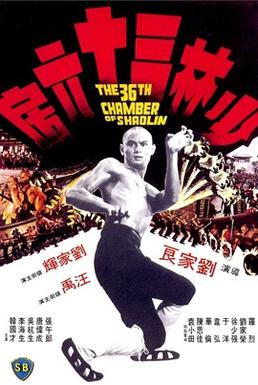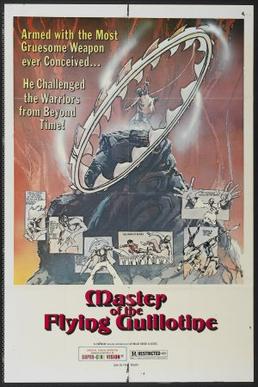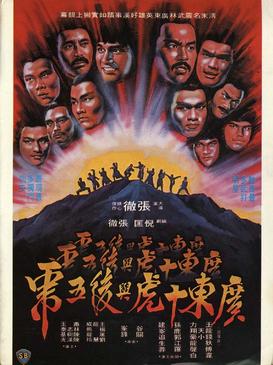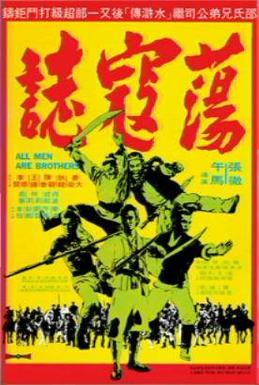Plot
Ti Hau is a pupil of Master Ti, a high-ranking member of a boxer clan during the time of the Boxer Rebellion (1899 - 1901). Ti Tan, is a Member of a competing boxer clan who has successfully trained his students to resist penetration from swords (Golden Bell), but sacrifices them by experimenting with techniques to resist bullets. This appalls his niece, Fang Shao Ching. Lei Ying can control subjects with a voodoo doll and ventriloquism. The Yi Ho Society Chief, Li, explains that Lei Kung, an old pugilist master who left to form another branch in Yunan, has dissolved that branch and gone into hiding. Lei Kung no longer believes that their martial arts skills can defeat the modern weapons used by the western colonialists. Chief Yi proclaims Lei Kung a traitor to their movement. The chief orders his execution, and claims he can be identified because he enjoys showing off his kung-fu skills.
In Guangdong/Yunan, Ti Hau makes inquiries into the whereabouts of Lei Kung at a popular inn. Also searching is Fang Shao Ching, disguised as a man, and Lei Ying. They are unaware of each other's identities, but observe each other suspiciously. A flamboyant man also shows up and arouses suspicion. Ti Hau and Fang Shao Ching both suspect Lei Ying of being Lei Kung, and sneak into the attic above his room at the inn. They fight in the cramped space as Ti Tan walks into the room below, but he does not see them before they escape.
An old woodcutter, Yu, also arouses Ti Hau's suspicion because of his great strength. Fang Shao Ching distracts Ti Hau and lures him away, and they fight again but must stop to hide from Ti Tan. Fang explains to Ti Hau that her and Ti Tan are also Yi Ho members sent to kill Lei Kung, but she maintains her male disguise.
Under Fang's guidance, Lei Kung practices with his weapons. Ti Hau, who has been bedridden, sees him, but Lei Kung maintains his identity as the woodcutter Yu by saying that he only looks like Lei Kung, and must defend himself. They both discover that Fang is a woman. When Ti Hau regains his strength, he is grateful to Yu for taking care of him and is about to leave, but Ti Tan arrives. Fang and Ti Hau fight him before Yu, now at full power, engages him. He finally admits to everyone that he is Lei Kung, and declares that he has betrayed the Yi Ho society because he does not want to see all his young students die in a futile attempt to fight foreign modern guns and cannon. He disables Ti Tan, who admits defeat and leaves. Ti Hau feels betrayed and also leaves.
Soon after, a Magic Fighter turns up. Fang, believing it to be Ti Hau, berates him as he sits down and prepares, but is then shocked when it's revealed to be Master Tieh. Master Tieh being Ti Hau's sifu (master), and head of the Magic Clan. Master Tieh and Lei Kung engage in a duel, but Ti Hau arrives and interrupts. Master Tieh attempts to uses his mind control techniques on Ti Hau, in order to have him effectively commit suicide, announcing that both he and Lei Kung must die. However Lei Kung intervenes using a Snake Halberd against Master Tieh's 'Double Axe', saving Ti Hau and then disarming Master Tieh. Defeated, Master Tieh chooses to commit suicide using the same eye gouging technique on himself that he (using his mind control) tried to get Ti Hau to do. But, Ti Hai stops him, shaking his head, understanding that there's no point in such meaningless sacrifice. Master Tieh looks at Lei Kung, with a sadness in his eyes that convinces Lei Kung to lay down his weapon, the inference being that he sees how the deaths of so many innocent, young students to further a dead cause serves no real purpose. Ti Hau steps forward and is willing to follow his master, but Master Tieh suggests he remain with Lei Kung, so he can develop both his kung fu and his sense of self-awareness and understanding.
Lei Kung dresses in ceremonial garb and arrives at a temple with Ti Hau, Fang Shao Ching, and a full set of weapons. Lei Ying is waiting, and reveals his plan. He wanted Lei Kung to regain his expertise and kill the other assassins. Then Lei Ying could avoid fighting others and concentrate on Lei Kung, killing him and elevating his position in their clan and Yi Ho Society. After an 8-minute duel showcasing most of the 18 weapons and hand-to-hand combat, Lei Kung demonstrates that he could win if he wanted to. But instead, he leaves Lei Ying to his disgrace.

The 36th Chamber of Shaolin, also known as The Master Killer, Shaolin Master Killer and Shao Lin San Shi Liu Fang, is a 1978 Hong Kong kung fu film directed by Lau Kar-leung and produced by Shaw Brothers, starring Gordon Liu. The film follows a highly fictionalized version of San Te, a legendary Shaolin martial arts disciple who trained under the general Chi Shan.
Alexander Fu Sheng, also known as Fu Sheng was a Hong Kong martial arts film star in the 1970s.
Lau Kar-leung, was a Chinese actor, filmmaker, choreographer, and martial artist from Hong Kong. Lau is best known for the films he made in the 1970s and 1980s for the Shaw Brothers Studio. His most famous works include The 36th Chamber of Shaolin starring Gordon Liu as well as Drunken Master II starring Jackie Chan.

Shek Wing-cheung, better known by his stage name Shih Kien, Sek Kin, or Sek Gin or Shek Kin(Chinese: 石堅; pinyin: Shí Jiān; Jyutping: Sek6 Gin1), was a Hong Kong–based Chinese actor. Shih is best known for playing antagonists and villains in several early Hong Kong wuxia and martial arts films that dated back to the black-and-white period, and is most familiar to Western audiences for his portrayal of the primary villain, Han, in the 1973 martial arts film Enter the Dragon, which starred Bruce Lee.

Master of the Flying Guillotine is a 1976 Hong Kong wuxia film starring Jimmy Wang Yu, who also wrote and directed the film. It is a sequel to Wang's 1971 film One-Armed Boxer, and thus the film is also known as One-Armed Boxer 2 and The One-Armed Boxer vs. the Flying Guillotine.

Walter Tso Tat-Wah was a film actor of Hong Kong, most famous for the roles he played in a number of Wuxia films in the 1950s and 1960s.
Hsiao Ho, is a Hong Kong martial arts film actor, stunt performer and action choreographer. A Hakka, he has acted in many films directed by Lau Kar-leung, including Mad Monkey Kung Fu and Legendary Weapons of China. In 1985 he portrayed legendary kung fu warrior Fong Sai-Yuk in the Lau directed action-comedy, Disciples of the 36th Chamber and also took a lead role in Fake Ghost Catchers, directed by Lau Kar Wing. Fake Ghost Catchers is marketed by Celestial Pictures as being made two years before Ghostbusters. Hou is also known for portraying the "disfigured swordsman" and doubling complicated action scenes in 1993's Iron Monkey. He was also the action director for the movie Shaolin Avengers (1994). In 1982 he was nominated for Best Action Choreography for the movie Legendary Weapons of China at the Hong Kong Film Awards alongside Lau Kar Leung and Ching Chu who also provided choreography for the film.

Five Shaolin Masters a.k.a. 5 Masters Of Death is a 1974 Shaw Brothers kung fu film directed by Chang Cheh, with action choreography by Lau Kar Leung and Lau Kar Wing.

Ten Tigers from Kwangtung is a 1980 Hong Kong martial arts film directed by Chang Cheh and produced by Mona Fong. It is one of Chang Cheh's tales of Shaolin's historic rivalries with the Qing dynasty and the Canton Tigers. Along with the Brave Archer series, Ten Tigers had an all-star cast of Shaw martial artists.

Born Invincible is a 1978 Taiwanese kung fu film directed by Joseph Kuo, with action choreography by Yuen Woo-ping, and starring Carter Wong, Jack Long and Lo Lieh. Currently, only the English language dubbed version is widely available on UK DVD format. The original Mandarin version was released onto VHS format in the 1980s and is now out of print. A rare Japanese language dubbed version can be found online. There is a Spanish (Spain) language dubbed version available too.
Filmography for the Indo-Chinese Hong Kong film actor and martial artist Lo Lieh:

The Deadly Duo is a 1971 Hong Kong Wuxia film directed by Chang Cheh, and starring David Chiang and Ti Lung.

All Men Are Brothers, also known as Seven Soldiers of Kung Fu, is a 1975 Hong Kong wuxia film based on the Chinese classical 14th century novel Water Margin. The film was produced by the Shaw Brothers Studio and directed by Chang Cheh and Wu Ma.
Herman Kwan Hoi-San was a Hong Kong actor. His English name was Herman Kwan. Kwan started off as a Cantonese opera actor in street theatre before joining New Voice Opera Troupe (新聲劇團). He also started singing for early Hong Kong film soundtracks and moved on to act in films, mostly adaption of opera in Cantonese. He became famous and acted in many lead roles. When Hong Kong films started to move towards Mandarin, Kwan's career faltered and joined TVB and acted in various roles. Directors and filmmakers rediscovered his talent and cast him in many supporting roles in films. In 2001, Kwan suffered a stroke and was left mute and paralysed. He died in 2006.

Dick Wei is a Taiwanese actor, director and writer who specializes in martial arts and action films.

Gods of Honour is a Hong Kong television series adapted from the 16th-century novel Fengshen Bang, a Chinese vernacular classic written by Xu Zhonglin and Lu Xixing. The series was first aired on TVB Jade in Hong Kong in 2001. It starred Benny Chan, Chin Kar-lok, Irene Wan, Michelle Ye, Dickson Lee, Yuen Wah, Kingdom Yuen and Winnie Yeung in the lead roles.

The Iron Buddha is a 1970 Hong Kong ' film directed by Yan Jun and produced by the Shaw Brothers Studio, starring Ling Yun, Fang Ying, Chan Hung-lit, Wong Chung-shun, Yue Wai. The film featured action choreography by Sammo Hung, who also appears in a minor role.
Carter Wong is a Chinese actor and martial artist, who is mainly known for roles in Kung Fu action movies. The biggest movies he was featured in are Big Trouble in Little China (1986), and Yong zheng ming zhang Shao Lin men (1977). As an actor, he contributed to more than seventy martial arts films. He also worked as a stuntman in films, and was the fighting instructor for the movie Rambo III. Wong is still active in martial arts.
Phillip Ko-Fei was a Hong Kong film actor, filmmaker and stunt coordinator.
Fung Hak-on was a Hong Kong actor. He appears in Hong Kong films since the 1960s until mid 2010s.












